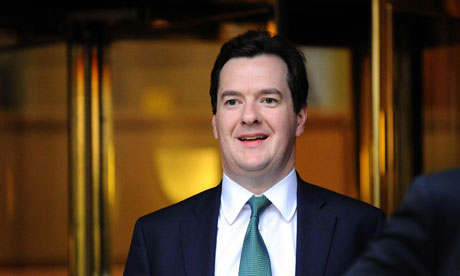
Around 100,000 public sector workers could see their jobs saved following the Treasury's shift away from Whitehall spending reductions to deeper cuts in welfare payments, the government's new spending watchdog is expected to reveal tomorrow.
Plans to cut almost 500,000 jobs across the public sector over the next five years could be revised to 400,000 after ministers balked at making unprecedented cuts in departmental budgets.
The forecast is believed to feature in the Office for Budget Responsibility's assessment of last month's comprehensive spending review.
Ernst & Young Item Club analysts said fears among public sector workers could be partially offset by tougher measures to reduce welfare spending. It said additional welfare reforms would enable the chancellor, George Osborne, to bolster departmental budgets by an extra £11bn by 2014/15.
The chancellor will respond to the OBR's revised figures in his autumn statement tomorrow. They are expected to trigger a bitter war of words between Osborne and shadow Treasury spokesman Alan Johnson about the effects of austerity plans on the UK's growth prospects. Johnson will argue growth could be jeopardised by the cuts and their impact on unemployment. The chancellor will also come under fire from critics concerned the Treasury lacks a plan to avoid the effects of the debt crisis engulfing Ireland and Portugal.
Osborne will claim the government's austerity plan has prevented the UK from losing its AAA credit rating, kept interest rates low and maintained growth. He will warn that the economy faces a bumpy ride, but is expected to face down critics concerned that cuts in public spending and higher taxes could increase unemployment and halt growth.
The OBR, an independent watchdog set up by the coalition government shortly after it came to power in May, will publish updated growth and borrowing forecasts that will provide the fiscal framework for the government's next budget in March. Its updated assessment is likely to be positive: since its last forecasts in June, GDP growth has been stronger and tax receipts higher than predicted.
Data from the Office for National Statistics show the UK enjoyed its best six-month performance in a decade between April and September, helping corporate tax revenues rise on the same period last year. Based on these figures the OBR is likely to raise its 2010 growth forecast from 1.2% to around 1.7%, and say borrowing this fiscal year could come in slightly below the £149bn it was expecting.
However, the OBR's longer-term growth projections are considered by many economists to be on the optimistic side and are unlikely to be revised up. Its current 2011 GDP growth forecast of 2.3% is above the consensus forecast of 1.9%, and its forecasts of 2.8% for 2012 and 2.9% 2013 are similarly upbeat.
Adam Lent, chief economist at the TUC, said he hoped the chancellor would be circumspect about growth prospects. "It is bizarre that the chancellor can stand up in parliament and be so certain about the economy's prospects in 2011. The OBR concedes it only has a 40% chance of getting within one percentage point of its central forecast, which doesn't discount a double-dip recession."

No hay comentarios:
Publicar un comentario